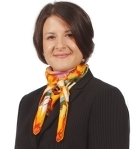Meet the Board: Elizabeth Lintz, Director, Goulston & Storrs
This is part two of our newest feature: Meet the Board! Members of the Clearinghouse Board of Directors work in both the legal and nonprofit sectors. Their wide variety of practice areas and skill sets are an invaluable resource as the Clearinghouse expands its programs and seeks new and better ways to serve the community. We hope this feature will offer insight into board service and the many ways attorneys can volunteer their time and expertise.
 A Director at Goulston & Storrs, Liz Lintz practices in the firm’s Real Estate Group. She represents developers, lenders, and owners in a variety of real estate matters and has extensive experience with low-income housing and historic tax credit financing projects.
A Director at Goulston & Storrs, Liz Lintz practices in the firm’s Real Estate Group. She represents developers, lenders, and owners in a variety of real estate matters and has extensive experience with low-income housing and historic tax credit financing projects.
Liz has been a member of the Clearinghouse Board for five years. Below, she explains what inspired her to become an attorney, why she was compelled to join the board, and why the Clearinghouse’s pro bono work is important to her. She also talks about her most memorable pro bono experience.
Why did you pursue a legal career?
After graduating from New England Conservatory of Music, I worked there in development and alumni relations. A number of people on the conservatory’s alumni and leadership boards were lawyers whom I admired. They were articulate and passionate advisors who used their time and talent to support an institution that was important to them. I wanted to become more like them and thought I had some of the raw materials necessary to make that happen.
How were you initially connected with the Clearinghouse board and why do you feel board service is important?
Goulston & Storrs has had a strong relationship with Lawyers Clearinghouse since its beginning. David Abromowitz, of Goulston and now also the Chief Public Policy Officer for YouthBuild, was one of the Clearinghouse’s founding members. Goulston’s continued participation in the Clearinghouse’s legal clinics for the homeless is one of the ways we fulfill our commitment to providing pro bono legal services to underserved communities.
I have a great job that brings me into contact with many intelligent and successful people and their businesses. But I exist within the fabric of a city where more than 20% of the population lives in poverty. Board service is important because it allows someone like me to support the work of an organization that is doing something meaningful to help people who are struggling.
Why do you think the Clearinghouse’s work to connect nonprofits and the homeless with free attorneys is important to the community?
The need for pro bono legal services is staggering. For instance, Greater Boston Legal Services has to turn away about 60% of the low-income people who come to them looking for assistance. On the other side of the equation, there are a lot of lawyers who want to help. The Clearinghouse connects these lawyers with homeless people and organizations who serve them, which benefits everyone involved.
What is your most memorable pro bono experience?
My colleague, Amy Schnitzer, and I represented a delightful man who lost his green card. He had worked in city government earlier in his life, had an avid interest in politics, and was now retirement age. The loss of his green card meant that he was unable to work, had no access to retirement benefits to which he was entitled, and eventually became homeless.
We were able to get him a replacement green card, which was great, but the most satisfying part of the experience was when we accompanied him to the Social Security Administration office and then to the bank to open an account where his retirement benefits could be deposited. The fact that he showed up with two lawyers in both places meant that he got prompt and kind attention. It’s not that I assume he would have been treated rudely, but I got the sense that our being with him reminded others that our client was a person worthy of respect. It felt good.